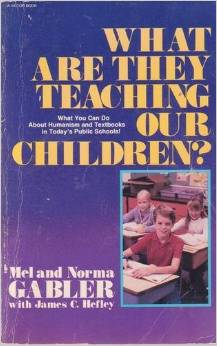Have you seen it yet? The New York Times just published Dana Goldstein’s comparison of US History textbooks from California and Texas. The results won’t shock SAGLRROILYBYGTH. This morning I’ll offer a little additional history of the long feud over US History textbooks.
As Goldstein documented, US History textbooks look very different in the two states, even though they come from the same publisher and include the same authors. Yet the differences can be glaring. For example, in a section on the Constitution, the California edition notes that there have been some restrictions on Second Amendment gun rights. The Texas edition leaves that part blank. The California editions emphasize African American struggles and LGBTQ history far more than do the Texas ones.
It’s not only US History textbooks that have experienced this sort of regional culture-war editing. As Adam Shapiro explained in Trying Biology, science textbooks have long been an awkward weapon in evolution/creation culture wars.
As I argued in The Other School Reformers, in the twentieth century conservatives worked hard to promote a more-conservative textbook option. Their record was mixed. At times, conservative history-textbook activism flopped in embarrassing ways.
For example, in 1925 the American Legion commissioned a new, patriotic history of the United States. Too often, the Legion complained, American youth “grow up ignorant or anarchistic or otherwise ‘destructive.’” They needed a textbook that told the nation’s history as it really was. Namely, the Legion insisted, despite “occasional mistakes,” American history has been “so glorious that its proper study must inspire any child to patriotism.”

From the Legion commission’s report, 1926
Unfortunately for the American Legion, the actual textbooks they commissioned were terrible. Like, Jefferson Lies terrible. After a prominent historian called them “perverted American history” in The Atlantic, the Legion appointed a special commission to analyze the books. After this Legion commission concluded that the books were “filled with incomplete and inaccurate statements,” the Legion withdrew their support and the textbooks stayed in their warehouses.
Other conservative activists have had far more success with their history activism. Most famously, the roots of the Texas bias that Dana Goldstein uncovered can be traced to the Daughters of the American Revolution. Journalists tend to focus on the textbook activism of Mel and Norma Gabler, which began in the 1960s. That activism mattered, but the Gablers got their ideas from the Texas DAR.
For decades, the DAR—at both national and state levels—made history textbooks the focus of their activism. For instance, in 1928 the national President General told the annual gathering that some state DARs had chosen
to look into the matter of textbooks used in some of the schools. Individuals have sounded a warning that many books deny the Christian faith and contain sacrilegious and scornful sentences which will have a disastrous effect upon the impressionable minds of the young.
In 1941, a new President General repeated this call, in more gendered terms. As Helen Pouch exhorted her DAR audience,
Do all that women can do to eradicate questionable textbooks from the schools. This can and has been done in many cities. It should be done in every city where these books are used.
Similarly, in 1950 new President General Marguerite Patton told the assembled DAR:
members should be especially aware of the schools in their own communities. They should know the teachers who instruct their children; they should know the wording of textbooks, especially those pertaining to American history; and they should be cognizant of the manner in which the teachers present the subject matter to the pupils. The interpretation of historical data can be, and often is, twisted erroneously, if a teacher is inclined to do so.
These decades of DAR activism paid off. DAR members were in a position to send uninvited “inspectors” to local schools to read textbooks and listen in on classroom teaching. They had the energy and drive to read through history textbooks to sniff out evidence of progressive politics or anti-patriotic teaching.
By the 1960s, their activism had become an expected part of textbook politics, especially in Texas. It lasted well into this century. If you haven’t seen The Revisionaries yet, it’s worth a watch. The documentary examines the conservative takeover of the Texas State Board of Education in the early 2000s.
Science and history were both targets of the new conservative majority. Creationist Don McLeroy wanted the science textbooks to help students reject mainstream evolutionary theory. McLeroy and his conservative allies also hoped to skew the history textbooks in a more conservative direction. From the list of required terms, the conservatives cut out “hip-hop” and inserted “country music.” They insisted on more about Reagan and the NRA.
More recently, too, Texas tweaked its list of required historical terms. In 2018, “Hillary Clinton” was out, but “Billy Graham” stayed in as terms Texas students needed to know.
It might seem shocking to some, but Texas’s careful curation of its history textbooks has a long and checkered history. Conservatives haven’t always won in Texas or elsewhere. When they did win, it was by harping on two points.
1.) Conservatives won by insisting their patriotic, conservative history was truer than other options. Conservatives haven’t won by saying kids should be kept ignorant. They’ve won by arguing that their vision is closer to historic fact. And,
2.) Conservatives won by insisting those other histories were at best misleading and at worst downright subversive. As always, any whiff of danger to students always makes parents and school administrators nervous. Conservatives have won their history-textbook wars when they’ve convinced enough people that their version of history is safer for both students and society.

















